If you're anything like me, you love your olive oil.
It's such a versatile ingredient – you can drizzle it over a salad, or use it to flavor some bread. It pairs excellently in marinades too.
Beyond enhancing the taste of your dishes, olive oil also sports an impressive array of purported health benefits.
In this post, let's talk about the many uses of olive oil – even beyond the culinary – and how the golden oil might benefit your health.

To put it simply: olive oil is a liquid fat pressed from whole olives and commonly used in cooking. Initially, its utility was in oil for lamps, but olive oil also finds use in soaps, pharmaceuticals, religious ceremonies, and more.
Olive oil comes from olives, which grow on a tree from the Oleaceae family, Olea europaea. Olive trees are native to the Mediterranean region, and olives and olive oil are still of major importance economically and culturally in the region.
In fact, for Mediterranean cuisine, it's one of the three core or trinity ingredients of the cuisine (the other pillars being wheat and grapes).
To this day, the Mediterranean region remains the top producer of olive oil – with Spain leading the pack. However, olives are now grown all over the world.
In the US, olive trees are grown for olive oil production in Oregon, Hawaii, Texas, Georgia, and California.
Olive oil is a common ingredient in the Mediterranean region, and you can trace its utilization back several thousand years.
You might be surprised to learn that the various uses people find for olive oil today aren't exactly new. Around 2500 BCE in the Mediterranean, olive oil was used as fuel for lamps or in rituals from religious to anointing warriors.
Early olive oil users also found olive oil useful for various skincare applications, soap-making, and medicines.
Although olive oil found many uses in ancient times, there isn't any contemporary evidence it was used for cooking (or otherwise consumed).
The first evidence of culinary usage of olive oil is found in roughly the 5th or 4th-century BCE. At that point, the Greeks knew and used butter, but preferred olive oil.
And it wasn't just the Greeks enjoying the bounties of the olive tree. Olive oil (and olives themselves) became a food staple in the ancient Roman world too. Romans cooked with olive oil using similar styles to how we use it today: they fried their food in olive oil, mixed it with vinegar as a dip, and used it to create many popular sauces.

The general means of making olive oil for consumption hasn't changed over time. You still need to remove any leaves and stems from olives before you wash and press them. The only difference from ancient times to now is the tools we use nowadays for pressing are much more advanced.
Traditionally, specialized stone equipment was used for crushing olives. Nowadays, machines use steel rollers to crush olives and their pits and grind them into a paste. Modern oil processes feature mixing chambers that prevent oxidation by using harmless gas.
Depending on the total processing, you'll get various designations of olive oils such as the oft-used virgin and extra-virgin.
Extra-virgin olive oil is known as "great olive oil" in the sense that it has a low acidity grade. This variety is ideal for eating uncooked, and it maintains a good flavor.
The more refinement of the olive oil during the creation process, the less "virgin" quality it has. Virgin olive oil should have less than 2% acidity. (Once you exceed 3.3% of acidity, it's no good for human consumption.)
Olive oil can also be refined so that you can use it (in an easier way) while cooking. The most commonly seen refined olive oils are light (and extra-light) olive oil, which has a higher smoke point and is easier to use on the stove.
These refined oils have undergone fine filtration, so many of the natural flavors, antioxidants, and aromas found in virgin olive oil are gone. Virgin and extra-virgin olive oils have a wide range depending on the oil (around 325°F - 400°F,) while refined varieties can be upwards of 410°F.
Like with so many other foods, olive oil has rather complex regulation and adulteration systems throughout the world.
There's an International Olive Council (IOC) that tracks production and quality standards of olive oil produced around the globe. In addition to the European Union, there are 16 member states in the Council – but notably, the U.S. is not a member.
Since the US isn't part of the IOC, the US Department of Agriculture (USDA) doesn't recognize their classifications... even though the IOC governs around 95% of international production of olive oil.
The USDA decided on its grades and standards. They recognize five grades of olive oil (including US Virgin Olive Oil Not Fit For Human Consumption Without Further Processing). They also acknowledge three qualities of olive-pomace oil. Pomace olive oil is extracted via chemical processes from normally unviable parts of the olive tree, such as seeds, stems, and leaves.
However, testing is arduous, and the tests aren't always reliable – the US Food and Drug Administration (FDA) is only able to test a tiny minority of imported olive oils. Some estimates suggest that 50-75% of all olive oils sold as extra virgin in the United States are adultered with lower quality olive oils – or even substitution with other vegetable oils.
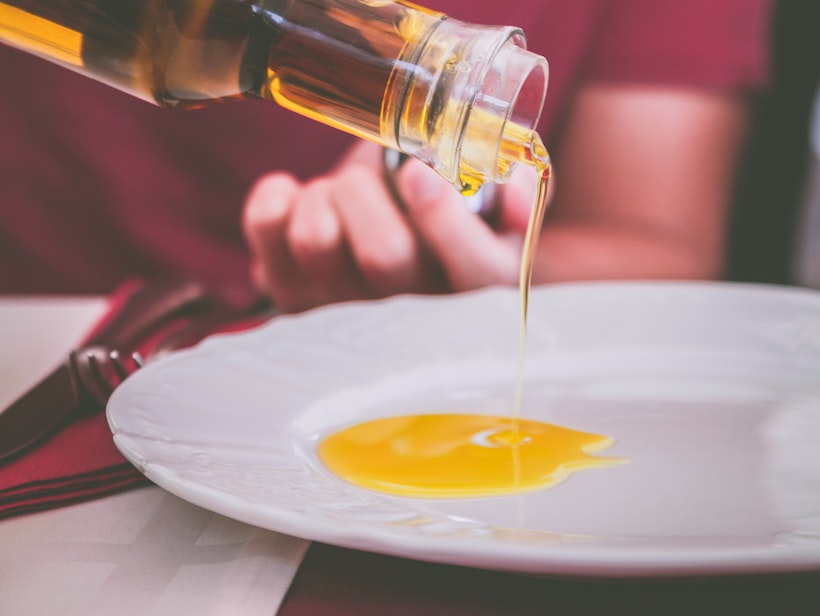
Now that you know some of the history – and current regulation – of olive oil, let's talk about the fun part: consuming it.
Some people may say extra-virgin varieties are only good uncooked or raw, but that simply isn't true. You can drizzle it over a salad or use it as a bread dip, but you can just as easily cook with it as long as you keep the heat low and do it right.
This smoke point, the temperature where EVOO begins to burn, is pretty low. It's between 325°F - 375°F. It's among the lowest smoke point when compared to other kitchen oils.
So, don't start it off on high heat as that's sure to burn it. Of course, you can still use it as a finishing drizzle over pasta and salads, stir it into hot or cold sauces, or dress up a sandwich.
For higher heat, it's best to switch over to the more refined varieties such as light and extra-light olive oil.
As I mentioned before, the ancient times saw olive oil used for various means besides cooking. And yes, olive oil's use in cooking is a later development.
Nowadays, you can use olive oil as a makeup remover, a skin moisturizer, a hair treatment... or even to buff out stainless steel.
If you aren't fond of consuming it, don't get rid of your oil. You're bound to find something around the house or on yourself that a little dose of olive oil can help.
As with any foods, olive oil consists of a combination of ingredients beyond just olives. According to the USDA, olive oil contains a myriad of different fats, vitamins, and minerals. The magical mixture is what makes olive oil so enticing – let's look at some of the highlights.
The antioxidants inside olive oil act as a natural preservative – they delay the onset of oxidation from refinement and storage. Inside of our own body, antioxidants counteract free radicals – offering some of the health benefits that I'll explore later on.
Some of the prevalent antioxidants inside olive oil are Vitamin E and various polyphenols.
In olives alone, there are more than 30 polyphenols. Of these micronutrients, compounds like hydroxytyrosol have greater antioxidant potency than other polyphenols found in olives.
There are also various flavonoids, among them anthocyanins and flavones.
Another major group of polyphenols in olive oil is the lignans. They're non-flavonoids, and beyond acting as an antioxidant like other polyphenols, lignans also serve as a defense against bacteria. Additionally, they have a positive effect on Type II diabetes and other diseases.
Of course, one container of olive oil may not have the same amount of ingredients as another. The specific concentration of polyphenols inside olive oil, for instance, depends on a mixture of environmental and extraction factors.
Once there are variances, nutritional properties change just as much as the flavor, color, and aroma of the oil. This effect is also why extra-virgin olive oil is considered the healthiest option – it's the least refined or processed.
There are some beneficial fatty acids (and fats in general) in extra-virgin olive oil.
Olive oil is roughly 1/8 saturated fat, with the majority in the form of palmitic acid. Another 1/8 is polyunsaturated fat, with the majority of that slice consisting of the omega-6, linoleic acid.
The largest component of olive oil is the monounsaturated omega-9 fatty acid oleic acid. Generally, oleic acid occurs in its ester – lipid, or fat – form, but when there is too much free oleic acid it can make olive oil inedible.
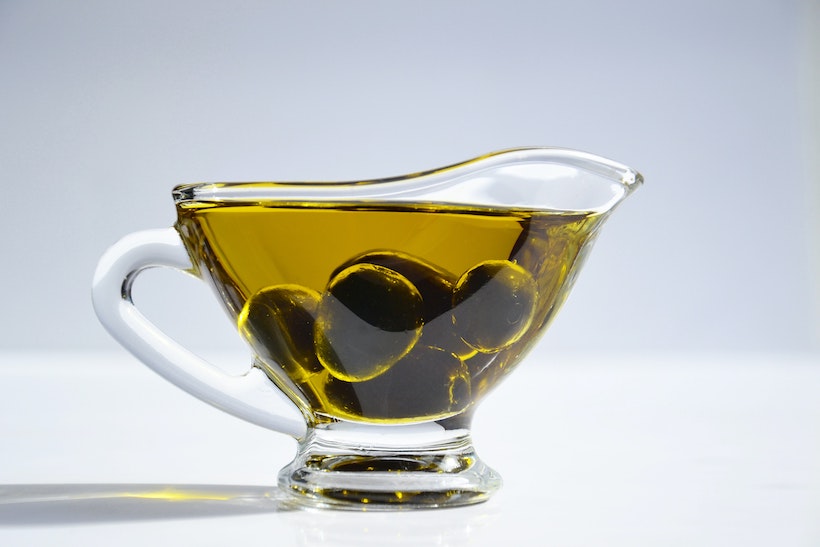
Now that we've got the olive oil history and nutrition out of the way, we can dive deep into the reason you're here: the proven health benefits of olive oil.
I've gathered 12 health benefits that olive oil has a strong claim on, supported by scientific research and evidence.
You remember a few years ago – innumerable studies went into learning how the Mediterranean diet improved cardiovascular health. Since olive oil was the most widespread ingredient used in the diet, the research focused on the antioxidant and anti-inflammatory properties it offered concerning atherosclerotic burden.
Additional health studies have since focused on the polyphenols in extra-virgin olive oil and concluded that there's increasing support suggesting olive oil can lower stroke risk. It would provide this benefit by providing its cardioprotective effects.
Alongside the other accumulating evidence of the positive benefits of the Mediterranean diet and olive oil consumption, there's increasing support suggesting a connection between olive oil and lowering stroke risk.
Research showed that the monounsaturated fat in olive oil lowered the risk of stroke by 41% in seniors compared to their peers who have never consumed olive oil.
Also, since it's known that high levels of LDL cholesterol are a risk factor for strokes, olive oil is known to lower that bad cholesterol.
Did you ever think that olive oil contributes to your cognitive health as well? Well, scientists are out to discover just how much an effect the oil has on our brains, and they've conducted a handful of studies so far.
In one study, participants who added extra-virgin olive oil (and the Mediterranean diet) into their life saw an improvement in cognitive function.
Additional studies focused on cognitive deficits, and those results found those who consumed olive oil experienced lower odds of deficits around verbal memory and fluency.
So, it's clear more research needs to go into these connections. However, the results so far appear promising.
Olive oil also appears effective at lowering blood pressure.
In one clinical study using olive leaf extract, subjects with stage-1 hypertension saw a reduction in their systolic and diastolic blood pressure.
Extra-virgin olive oil, if incorporated in your diet daily, might reduce the need for blood pressure medication.
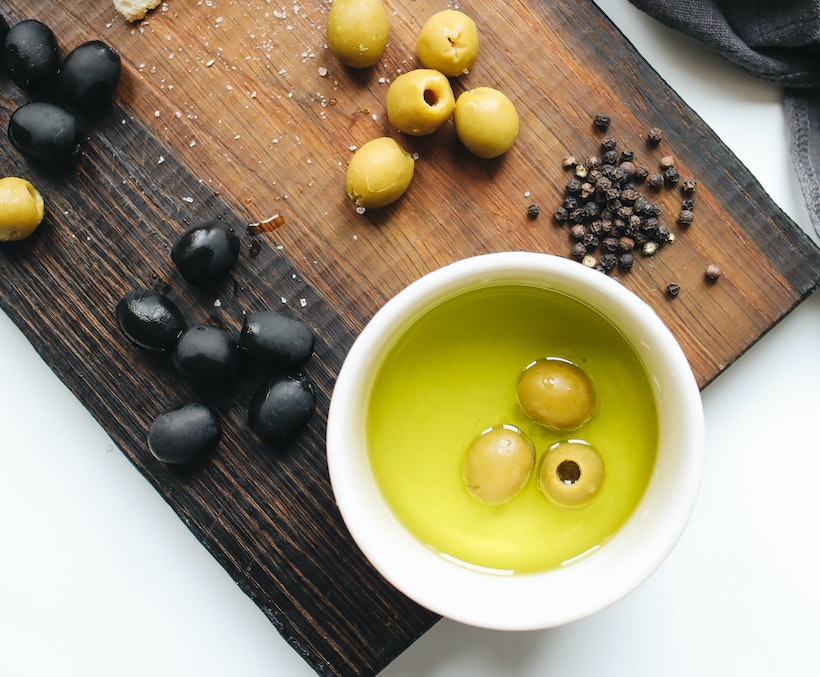
There are a few studies on the health benefits of olive oil that focus on its antimicrobial properties. One study addressed oleuropein, a glucoside found in green olives, and its byproducts. Its hydrolysis products were shown to inhibit the growth of the tested bacteria.
Further research confirmed that virgin olive oil strongly inhibits eight strains of H. pylori, a bacterium that's known to cause complications such as stomach ulcers.
It's no surprise that research has gone into discovering if olive oil affects various cancers.
Many studies have focused more on the complete Mediterranean diet and the related fact that individuals in the region consume far more olive oil than those in non-Mediterranean regions. Research noted a lower rate of cancer mortality and morbidity in those areas.
That research also showed that individuals adhering strictly to the Mediterranean diet (and a large amount of olive oil consumption that comes with it) had reduced mortality for all types of cancers.
As for specific cancers where olive oil might be protective, a few studies have focused on colon cancer. However, the investigations into it aren't yet sufficient.
Even so, there's some promise. Some of the compounds in olive oil, such as hydroxytyrosol, can produce cell cycle arrest as well as promote apoptosis.
Apoptosis, otherwise known as cell death, is of high interest to clinicians for managing and treating colorectal cancer. Some studies into olive oil indicated it could promote apoptosis, giving hope that further benefits to colon cancer treatment can be found. But – the jury's still out on this one.
On the brighter side, olive oil extract was also utilized to treat melanoma tumors (in mice). That study found olive oil can significantly reduce tumor volume. When combined with other chemotherapeutics, olive oil has promising anti-tumor and anti-melanoma potential.
There's in vitro and in vivo research into extra-virgin olive oil and how it acts as an anti-inflammatory in certain diseases.
It's believed that regular consumption can lower the risk of developing Type II diabetes and cardiovascular diseases.
This might be thanks to the phenolic compounds found in extra-virgin olive oil. These compounds are not only antioxidants, but they have anti-inflammatory and immunomodulatory properties.
Scientists also discovered that freshly pressed extra-virgin olive oil resembled some pharmacological properties found in ibuprofen, a non-steroid anti-inflammatory drug.

I've mentioned a few times now that olive oil consumption can help prevent and manage Type II diabetes.
Some research addressed people who have a higher cardiovascular risk, and if those individuals adhered to the Mediterranean diet with regular olive oil consumption, it was effective in preventing diabetes.
The antioxidants in olive oil can help reduce damage from oxidative stress when there are high levels of sugar in your blood system. This effect can help prevent – or ameliorate – the effects of diabetes.
Although cooking food helps us digest it better, there's a risk that food loses a lot of its original nutritional value during the cooking process. But don't fear – olive oil is known to help foods keep more nutrients compared to other oils.
One study proved that stir-frying vegetables with extra-virgin olive oil didn't reduce the glucosinolate content. Vitamin C in the veggies remained close to where it began when uncooked.
Additional research indicated that individuals who consumed tomatoes sautéed in olive oil rather than other fats saw a massive increase in blood lycopene levels.
There's good research support around the ways olive oil can benefit people with osteoporosis.
One study followed people with osteoporosis-related fractures and discovered that individuals who increased their consumption of olive oil had a 51% lower chance of experiencing fractures.
This might be due to how olive oil's components – such as polyphenols – can prevent an overall decline of bone health. Since olive oil can reduce inflammation and oxidative stress, it might halt bone wasting, or even help improve your bone strength.
There's some potential in the use of olive oil and fighting Alzheimer's disease.
Research focused on the beneficial polyphenols, monounsaturated fats, and antioxidant properties in extra-virgin olive oil. It showed that it might help lower the prevalence of vascular disease – and it's known that vascular effects factor largely into late-onset Alzheimer's.
Further research into olive oil indicated it might be used as a liver protectant and a therapeutic substance.
Scientists also found that regular olive oil consumption may reverse liver damage, too. They found hydroxytyrosol can reverse the signs of insulin resistance.
The study tested mice on a high-fat diet with reduced liver enzymes and found greater enzyme activity after providing olive oil. Yes, mice – but promising stuff.
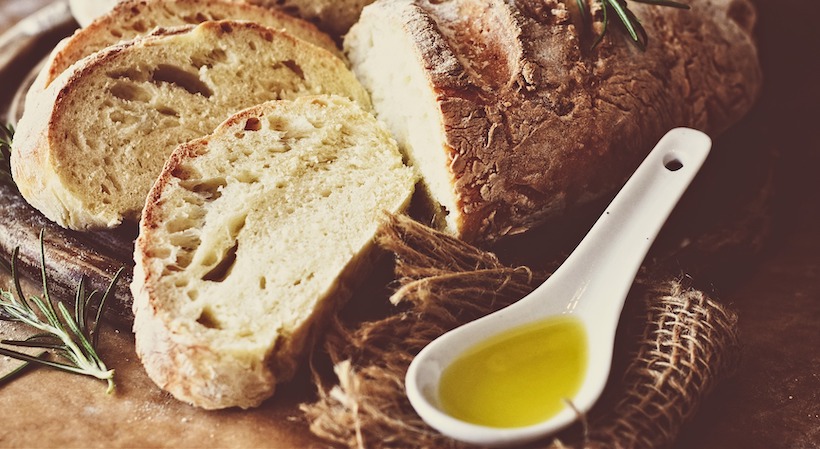
There are many proven health benefits of regular olive oil consumption, but don't think you can replace all your meals and drink olive oil without ill effect. I still believe olive oil is overwhelmingly a good oil, but let's look at some of the downsides.
If olive oil is consumed in large amounts, there's a chance that it can cause mild diarrhea.
Of course, that's true of most oils – it's just hard to digest a large amount of fat all at once, especially if you don't eat it with a substantial meal.
Olive oil, on its own, doesn't contain properties that will cause you to gain weight. However, it's still fat – you need to pay attention to the number of calories.
But again, the same goes for any food or drinks you consume. Olive oil is pure fat, which means it contains a good deal of calories – around 120 in a single tablespoon. So, just be mindful of the amount of olive oil you're eating and beware overconsumption.
Since olive oil comes from olives, if you have an olive allergy, you probably should limit your exposure to olive oil.
An olive allergy is a rare occurrence, but certainly, one that exists. You may indeed have a stronger response to actual olives than olive oil, but it's something you'll have to discover yourself.
Even outside of the most severe reactions like anaphylaxis, there's a risk of developing common allergic reactions such as sinus headaches, asthma, skin reactions, and wheezing.
Now that you know the benefits and the adverse effects, it's time to answer the question of the day: is olive oil good for you?
The short answer is: yes. Keeping in mind the caveats about (and taking care not to overconsume!), olive oil is a beneficial and healthy fat.
Olive oil has undisputed health benefits thanks to its components, and in cooking maintains the nutrient profile of foods while boosting the flavor.
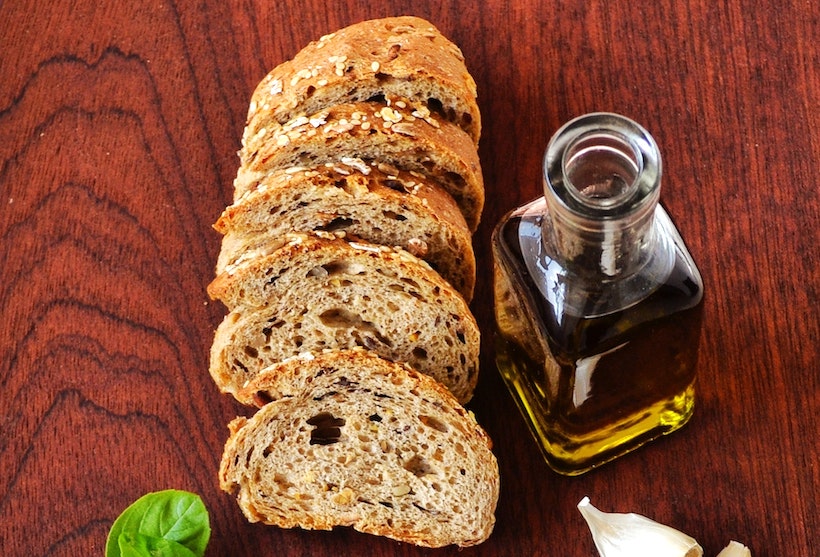
No matter what foods you consume, balance is everything. Too much olive oil leads to a high-calorie count, so it's essential to have it on the regular without consuming it too much.
Extra-virgin olive oil is your top choice for nutritional benefits, as it lacks the refining and processing that regular or light olive oil receives. EVOO is as close to pure as you can get and maintains the natural flavors and nutrients as much as possible.
Of course, there's nothing truly wrong with different grades of olive oil. Especially for other styles of cooking, it's useful to have light olive oil around. Just understand the difference in processing between all the grades.
As mentioned before, if you have an allergy to olives, you need to approach olive oil very carefully. You can always speak with your doctor to learn just how much it might affect you.
Also, those of you who may require a special diet that's low in fat and calories should talk to your physician before adding olive oil into your diet since it does add a significant amount of fat.
With the number of oils on the market, I understand how confusing it can be when deciding what to use.
Some people compare olive oil and canola oil, for instance. Canola oil is high in monounsaturated fats, just like olive oil. However, unlike olive oil, it's lower in saturated fats – and some evidence suggests canola oil could be bad for heart health.
For a vegetable oil, I love olive oil, avocado, coconut, and palm oil. I'd put them in my top tier of cooking oils to have around – with some specialty oils like peanut oil and sesame oil for Asian dishes.
And on that point – there's no denying the health benefit win with olive oil, but in terms of tastes, one type of oil isn't necessarily better than the other. It's based more on what you're cooking as some oils work better for certain foods than others.

Frankly, olive oil is an amazing substance, a tasty fat, and a healthy option to boot. Whether you're adding it to sauces, drizzling it on bread, or using it in your eggs, reaching for the olive oil is almost always justified.
So – embrace the olive. It has a long, rich history – in the kitchen and outside – and has proven its worth. Now, if you'll excuse me, I'm going to take inventory and make sure I have enough!